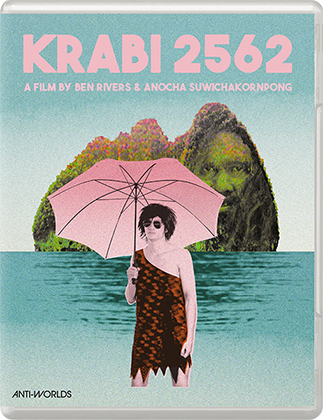Anocha Suwichakornpong and Ben Rivers’ Krabi, 2562 is a slippery place portrait and received an impressive Blu-ray release from Anti-Worlds
Krabi, 2562 (Ben Rivers & Anocha Suwichakornpong, 2019)
There is something absolutely perfect about the title, Krabi, 2562. In the first instance, it has an immediate distancing effect, especially given co-director Ben Rivers’ previous collaborations with Mark von Schlegell, which have toyed with the elision of documentary and science fiction. To many audience members, 2562 suggests a speculative portrait from the future, while in fact, 2562 relates to the very recent past in the Buddhist calendar. The title, then, refers perhaps somewhat more mundanely to a place and a (virtually) contemporary time. So, before we even begin, we’re being pulled between the extraordinary and the everyday, between speculative fiction and documentary, between the far-off future and the immediate past. All of which seems par for the course given the film’s other director is Anocha Suwichakornpong, whose extraordinary By the Time It Gets Dark expertly shifted tonally, formally, and temporally.
The second function of the title is that it provides a grounding to a film comprised of beguiling vignettes that can be difficult to parse in direct relation to those that have come before and after them. Time would seem to shift, characters recede and re-emerge, and stories seem not to interlink (at least at first) but the title reminds us where and when we are, locating the action even when what we are seeing suggests the narratives have become untethered. A scene in which a neanderthal man is seen in the forest surely means we have jumped back thousands of years, but the context confirms we’re still – somehow – in 2562. In doing this, the southwestern Thai town of Krabi in the year 2562 becomes the subject of the film, and the multitudinous strands that comprise this beguiling film become facets of it.
Perhaps the most beguiling strand of the narrative is the visit of a woman from central Thailand (played by Siraphun Wattanajinda) who claims to be a location scout for the movies, but the veracity of that detail remains as slippery as the rest of the film. We return to her on several occasions as she is shown around the surrounding environs and nearby islands by a local guide (Primrin Puarat). Her sequences are engrossing enough but are transformed by a specific scene in which an old cinema projectionist explains to a police officer about a woman mysteriously vanishing in the cinema. The next sequence presents the disappearance itself and we realise that the woman he is talking about is the character played by Wattanajinda. All of her prior time on screen is suddenly imbued with a sombre air, retroactively, giving the collection of moments the impression of being a reconstruction of her final days – as phrased by Nick Pinkerton in his review of the film for Sight & Sound, ‘a forensic investigation.’
But what precisely the film is a forensic investigation of remains nebulous – or perhaps more accurately, is wilfully and satisfyingly obfuscated by Rivers’ and Suwichakornpong’s playful, serpentine treatment. If Wattanajinda’s character really is a location scout for the movies, then her trip itself becomes part of a broader narrative about Krabi in which history, spirituality, and ecology are co-opted by the tight grip of commerce and tourism. Filmmaker Oliver Laxe appears as the European director of a soft drink commercial, in which the astonishing natural beauty of Krabi’s offshore islands is mobilised in the name of profit. Laxe also played a filmmaker abroad in Rivers’ The Sky Trembles and the Earth is Afraid and the Two Eyes Are Not Brothers, a film that probed at the knotty history of cinematic representations of an “exotic” locale. The same is true in this instance, where the effects of tourism are myriad, bringing prosperity – particularly in the case of the local tour guide who reappears throughout the film – and in gouging the pristine landscape. The ecosystem, it seems, is far more complicated than it might first appear, and throughout the film, nature appears to envelop and reclaim as much as it is eroded - chiming entirely with the film’s own shifting complexity and the implications of the filmmaking itself in Krabi’s ambiguous metanarrative.
The responsibilities of the filmmaker and the limits of the medium’s various modalities to represent the tangible world feed into the self-reflexive structural and formal mechanisms of the film. These are ongoing questions raised in the filmographies of both filmmakers and the halting of the aforementioned commercial by a director’s interjection via megaphone reminds of the staged re-enactment of the Thammasat University massacre in Suwichakornpong’s By the Time It Gets Dark, a film in which the stretching of such limits is paramount. Later in that film, a character seems to come face to face with their past self and there is an analogous moment in Krabi, 2562, in which the Thai musician Arak Amornsupasiri takes a break from playing a neanderthal man in an advert, only to come face-to-face with a real neanderthal in the nearby jungle. Elsewhere, the bats diving and wheeling around the auditorium of an abandoned cinema could be read as a less-than-subtle metaphor, but the disappearance of Wattanajinda’s character in that cinema - the place where her parents first met - and after being shown a shrine to cinema, undermines such simplicity. The powers at play are pulling in various directions; in time, in Krabi, inside the film itself, and beyond it.
The disc: This is the kind of physical media release that you can typically only dream of for this kind of new release of artist filmmaking - although three previous features made by Rivers and one by Suwichakornpong have come out on DVD and Blu-ray from the likes of New Wave, Soda and Second Run. This disc from Anti-Worlds more than lives up to expectations both in regards to the object itself and the treasures it bestows.
The package is beautifully presented with a reversible cover including a version of Luke Insect’s original poster (left). Accompanying the disc itself is a booklet featuring information on the various presentation alongside an essay by Phoebe Campion and an excerpt from a MUBI Notebook interview with the filmmakers by Jordan Cronk - both of which provide welcome insights that offer different entry points into the films overlapping strings.
As one might expect from Anti-Worlds (who are a relation to the much-coveted Powerhouse Indicator Blu-ray series), the disc itself is absolutely jam-packed with additional material that offers all manner of contextual and complementary viewing. Rivers and Suwichakornpong have recorded an audio commentary track with which the film can be viewed as well as a number of their other short films.
Rivers’ film Ghost Strata, which meditates on humanity’s impact upon the Earth, includes some footage from behind the scenes of Krabi, 2562 - linking it to The Sky Trembles… which featured behind-the-scenes material from Oliver Laxe’s Mimosas. Also present is the first collaboration between Suwichakornpong and Rivers’ 2018 short The Ambassadors, and two prior shorts by Suwichakornpong, Nightfall and Jai, which both showcase the director’s interest in work that traverses the apparent divides between documentary and fictional filmmaking modes.
Perhaps the most tantalising element of the disc is the inclusion of a feature called Sound Pieces, which comprises nine pieces that run across more than two hours by sound designer Ernst Karel who has worked with both filmmakers before as well as on other sonically striking work of recent years like Lucien Castaing-Taylor and Véréna Paravel’s Leviathan, Brett Story’s The Hottest August and Luke Fowler’s Electro-Pythagoras: A Portrait of Martin Bartlett. The nine works on this disc all utilise recordings made across the course of the film’s production and provide a non-visual context for Krabi, 2562 that is worth the price of the Blu-ray on its own.
Krabi, 2652 is available to buy on Blu-ray from Anti-Worlds.
Ben Nicholson is a writer and curator specialising in non-fiction, experimental film, and artists’ moving image. He is the founder and editor/curator of ALT/KINO.


